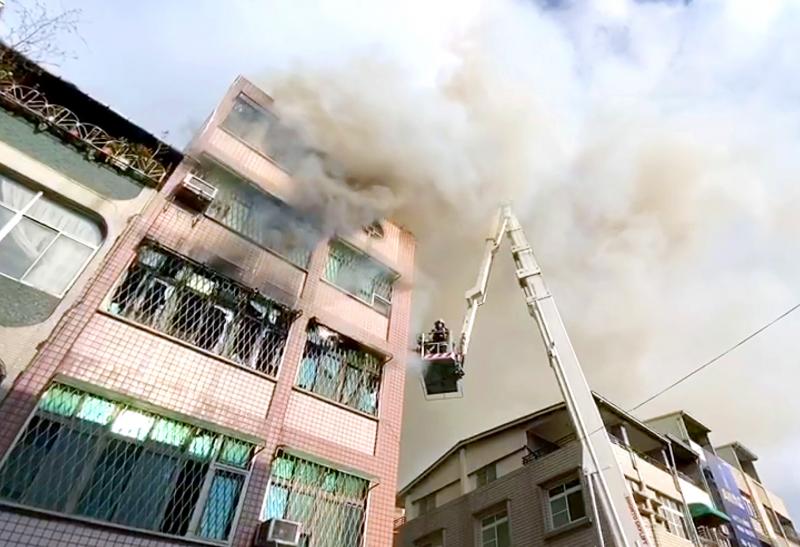Famed cardiologist Lai Wen-de (賴文德), the former director of Kaohsiung Medical University Chung-Ho Memorial Hospital, and his wife survived a fire yesterday in their five-story home in Kaohsiung, but their daughter, son-in-law and three grandchildren died in the blaze.
The Kaohsiung City Fire Department said it received an alert of the fire at about 7am, and by the time firefighters arrived at the house in Sanmin District (三民), the third, fourth and fifth floors were ablaze. At least 40 vehicles and 90 firefighters were deployed.
Firefighters heard Lai and his wife crying for help from the third floor and were able to rescue them, it said.

Photo: Chang Chung-yi, Taipei Times
Members of the department’s special search and rescue team found Lai Wei-an (賴韋安), her husband, Huang Yen-jieh (黃彥傑), and their three children — aged two, three and five — trapped by a collapsed ceiling on the fourth floor, severely burned.
All five were pronounced dead after being taken to a hospital.
Lai Wei-an was a doctor at Kaohsiung Chang Gung Memorial Hospital, while her husband was a physician in Jiann Ren Hospital’s family medicine department.
Second Battalion chief Chen Ming-tung (陳明桐) said an initial investigation suggested a short-circuiting electrical device on the staircase at the second floor level had sparked the blaze.
There were no smoke detectors or fire alarms in the house, he said.
The family had used wood in the interior design of the house and had a lot of wooden furniture, which helped fuel the blaze, while a balcony railing and 1.6m guard rails on the fourth floor had hampered rescue efforts, he added.
Lai Wen-de, had served as Presidential Office Secretary-General Chen Chu’s (陳菊) attending physician after she suffered a mild stroke in 2007 while she was Kaohsiung mayor.

CHAOS: Iranians took to the streets playing celebratory music after reports of Khamenei’s death on Saturday, while mourners also gathered in Tehran yesterday Iranian Supreme Leader Ayatollah Ali Khamenei was killed in a major attack on Iran launched by Israel and the US, throwing the future of the Islamic republic into doubt and raising the risk of regional instability. Iranian state television and the state-run IRNA news agency announced the 86-year-old’s death early yesterday. US President Donald Trump said it gave Iranians their “greatest chance” to “take back” their country. The announcements came after a joint US and Israeli aerial bombardment that targeted Iranian military and governmental sites. Trump said the “heavy and pinpoint bombing” would continue through the week or as long

TRUST: The KMT said it respected the US’ timing and considerations, and hoped it would continue to honor its commitments to helping Taiwan bolster its defenses and deterrence US President Donald Trump is delaying a multibillion-dollar arms sale to Taiwan to ensure his visit to Beijing is successful, a New York Times report said. The weapons sales package has stalled in the US Department of State, the report said, citing US officials it did not identify. The White House has told agencies not to push forward ahead of Trump’s meeting with Chinese President Xi Jinping (習近平), it said. The two last month held a phone call to discuss trade and geopolitical flashpoints ahead of the summit. Xi raised the Taiwan issue and urged the US to handle arms sales to

BIG SPENDERS: Foreign investors bought the most Taiwan equities since 2005, signaling confidence that an AI boom would continue to benefit chipmakers Taiwan Semiconductor Manufacturing Co’s (TSMC, 台積電) market capitalization swelled to US$2 trillion for the first time following a 4.25 percent rally in its American depositary receipts (ADR) overnight, putting the world’s biggest contract chipmaker sixth on the list of the world’s biggest companies by market capitalization, just behind Amazon.com Inc. The site CompaniesMarketcap.com ranked TSMC ahead of Saudi Aramco and Meta Platforms Inc. The Taiwanese company’s ADRs on Tuesday surged to US$385.75 on the New York Stock Exchange, as strong demand for artificial intelligence (AI) applications led to chip supply constraints and boost revenue growth to record-breaking levels. Each TSMC ADR represents

Pro-democracy media tycoon Jimmy Lai’s (黎智英) fraud conviction and prison sentence were yesterday overturned by a Hong Kong court, in a surprise legal decision that comes soon after Lai was jailed for 20 years on a separate national security charge. Judges Jeremy Poon (潘兆初), Anthea Pang (彭寶琴) and Derek Pang (彭偉昌) said in the judgement that they allowed the appeal from Lai, and another defendant in the case, to proceed, as a lower court judge had “erred.” “The Court of Appeal gave them leave to appeal against their conviction, allowed their appeals, quashed the convictions and set aside the sentences,” the judges